Let's talk endnotes. The Soul'd Out Music Festival ended its ninth-year last night with hip-hop legends De La Soul and Wyclef Jean. The night capped a five-day sonic marathon by national treasures like Erykah Badu and homegrown gems alike. The Portland music festival has grown into an event rivaling the bucket-list shindigs — tellingly accompanied by recent legal shockwaves. That this celebration of cultural black America has risen in a place with a pockmarked history of inclusion also merits a footnote. Portland's local music scene has always been dope, whether it's alternative or even hip-hop — but to become a magnet for world-class soul and R&B and everything in between?
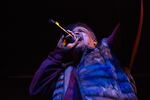
Plug 2 riles up "his side" of the venue.
Bradley W. Parks / OPB
Maybe we can take cues from the night's headliners. De La Soul has always been comfortable not fitting in. Their debut album from 1989 introduced an off-beat expressionism that forever flavored the world of hip-hop — think skits, poetics and random record sampling. With Wyclef Jean, being the perennial outsider is woven into his very fabric. The immigrant kid from Haiti, who got restless off "The Score" and ran for the Haitian presidency with just passable Creole, longs for home but has the soul of a nomad. That bears fruit in his eclefticism and countless collaborations.
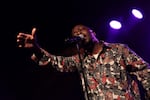
Wyclef Jean at the Wonder Ballroom.
Arya Surowidjojo / OPB
Perhaps Soul'd Out is a success for similar reasons. How do black history, Afro-futurism and globalist soul music fit into the uber-white Pacific Northwest? There's no obvious place for it, but DIY ingenuity and a love for reinvention runs deep here. Portland loves good music, and its growing cultural capacity means fertile soil for genres that continue to experiment and refine. That's why we can expect Soul'd Out No. 10 to be, well, sold out. -Arya Surowidjojo
De La Soul
De La Soul wants you to know they’ve been doing this for 30 years. And they’re over having their picture taken. Yes, they get photographers had a job to do Sunday for the closing set of Soul’d Out, and they were prepared to let us do it — under one condition: We participate with the crowd for the first few songs.
So we slung cameras on shoulders (some of the more bold photogs set them on bannisters to swim in the party gravy) and we danced. Reluctant as some might have been (not me; no shame in my game), what De La Soul has learned over that illustrious 30-year career is that people want to take part in what they’ve created.

Starry night inside the Roseland Theater.
Bradley W. Parks / OPB
With their debut album “3 Feet High And Rising,” De La Soul entered the pantheon of coolness before the dawn of a new decade: the 1990s. It’s a decade many now seek to claim as their own as it comes hurtling once again into vogue. Watch the music video for “Me, Myself and I” and it looks like any high-end streetwear lookbook of today: very loose pants, military-green jackets to the thigh, patterned poplins and Adidas tracksuits.
The men of De La Soul helped set trends that haven't worn off. They eventually let us take pictures, but they wanted us to partake at least a little — because they knew we really wanted to. Everyone did then and still does now. That's why they've been doing this for 30 years. -Bradley W. Parks
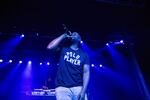
Plug 1 of De La Soul bursts onto the stage.
Bradley W. Parks / OPB
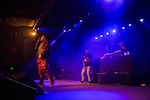
Plug 2 charges to the front for a verse.
Bradley W. Parks / OPB
Wyclef Jean + Crew
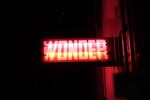
Last night of Soul'd Out at Wonder Ballroom.
Arya Surowidjojo / OPB
"Sak pase?!” (“What's up?) “Nap boule!" (“I’m good!”)
Yes, when all was said and done the Wonder Ballroom audience limped away with Haitian Creole greeting phrases under their tired, happy belts.
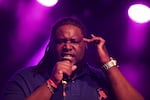
"C'mon baby, let's take it to the Caribbean." — Anael Jeannis
Arya Surowidjojo / OPB
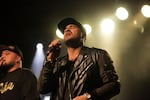
Island jams by the Culture Crew.
Arya Surowidjojo / OPB
It was a full on three-hour assault of island jams. Hometown talent Anael Jeannis warmed the audience up with creole hip-hop — telling stories between songs about his family's immigration journey from Haiti, first to Brooklyn then settling in Portland.
From the Pacific side, Utah-based Culture Crew crooned narratives on true love and really got the dancing going with popular reggae soul.
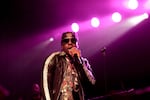
Ready or not: Wyclef Jean burned the Ballroom down.
Arya Surowidjojo / OPB
"I'm from Haiti, not some shithole."
By the time Wyclef came on stage the Ballroom was primed. It's not every day you get to hear a former presidential candidate rap, much less synthesize his musical prowess with counter jabs at the sitting U.S. commander-in-chief. The crowd went nuts.
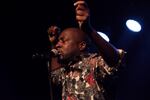
Wyclef brought back The Score, The Carnival and the glorious '90s.
Arya Surowidjojo / OPB
"Welcome to the '90s party," he chanted. Wyclef Jean released seven albums after 1997's "The Carnival," but he stuck tight to his debut numbers as well as Fugees songs — much to the audience's delight.
In music as in politics, the conventional wisdom to reach for nostalgia seem to hold fast. By the time Wyclef started a call and response for the Fugees' version of "No Woman No Cry," many in the audience were already hoarse.
So, he graciously finished the line for them:
"I remember when we used to sit in the government yard in ... Portland." -Arya Surowidjojo
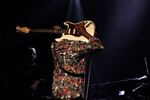
Wyclef knows how.
Arya Surowidjojo / OPB
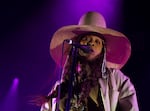
Erykah Badu stares straight into our souls.
Bryan M. Vance / OPB
Want More Soul'd Out?
Check out KMHD’s must-see artists and recommendations for any taste with this year’s Soul’d Out Festival guide. Case of FOMO? See photos and reviews from shows throughout the week: Day 1 | Day 2 | Day 3 | Day 4 | Day 5
